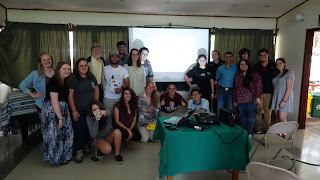This blog will explore the experiences of 15 Trinity University students on a month-long ecology course in Costa Rica in June 2017. This course is being offered in collaboration with the Monteverde Institute (http://www.monteverde-institute.org/).
Thursday, June 22, 2017
Response to 'The Costa Rican Dream'
The economic boom after WWII and the Costa Rican civil war allowed for the expansion of Costa Rica's middle class. The economic boom created more capital for social service, justice, and infrastructure investments that improved middle class life. Pesticides and technological advancements allowed for agricultural expansion from small farms to larger plantations. This generated more wealth and consequently more spending money for Costa Ricans. Small pulperías, which were like local corner stores that served rural communities, were replaced by supermarkets. Due to investments from foreign countries, infrastructural improvements were made across the country. Small groups of families tied to transnational companies held great influence and power over production. Costa Rican students took issue with this foreign involvement, exemplified by their protests against ALCOA (Aluminum Company of the Americas). Students were concerned about the amount of power being handed to foreign countries, and their protests ended successfully with the cancelation of the Aluminum company's contract to build a plant in CR. The postwar boom came to an end in the 1980's with an economic crisis caused by Costa Rica importing more than they were exporting. There was a crash in both industrial and agricultural production, causing CR to fall into debt and effectively ending the "Costa Rican Dream." After the presentation we discussed the differences of student activism around the world and how it reflects on our government. For example, protests in Costa Rica seems to be much more influential than those in the U.S., were te government is much larger and hard to have influence over. We talked about how foreign companies saw Costa Rican government as easy to manipulate as the government is less likely to regulate large, rich corporations. The government actually wanted them to invest their money on the country to bring income, as they didn't really care about natural resources or the environment at this time.
Subscribe to:
Post Comments (Atom)
Quotes, famous or not, from our Costa Rica trip.
I don't get mad, I believe in karma. We could wait for the rain to stop, but it probably won't. I just don't want my clothes...

-
What’s unique about the Monteverde Biological Station is that it lies at the convergence of two biological life zones – that of premontane ...
-
Brian and Chiara’s presentation went into the importance of coffee agriculture in Costa Rica. They pointed ou...
-
La Calandria provides a very distinct habitat to those we have previously visited on this trip. The land at La Calandria was previously use...

No comments:
Post a Comment